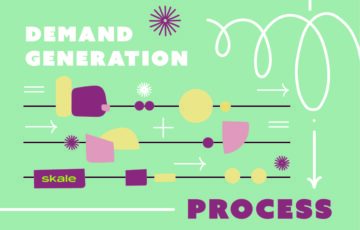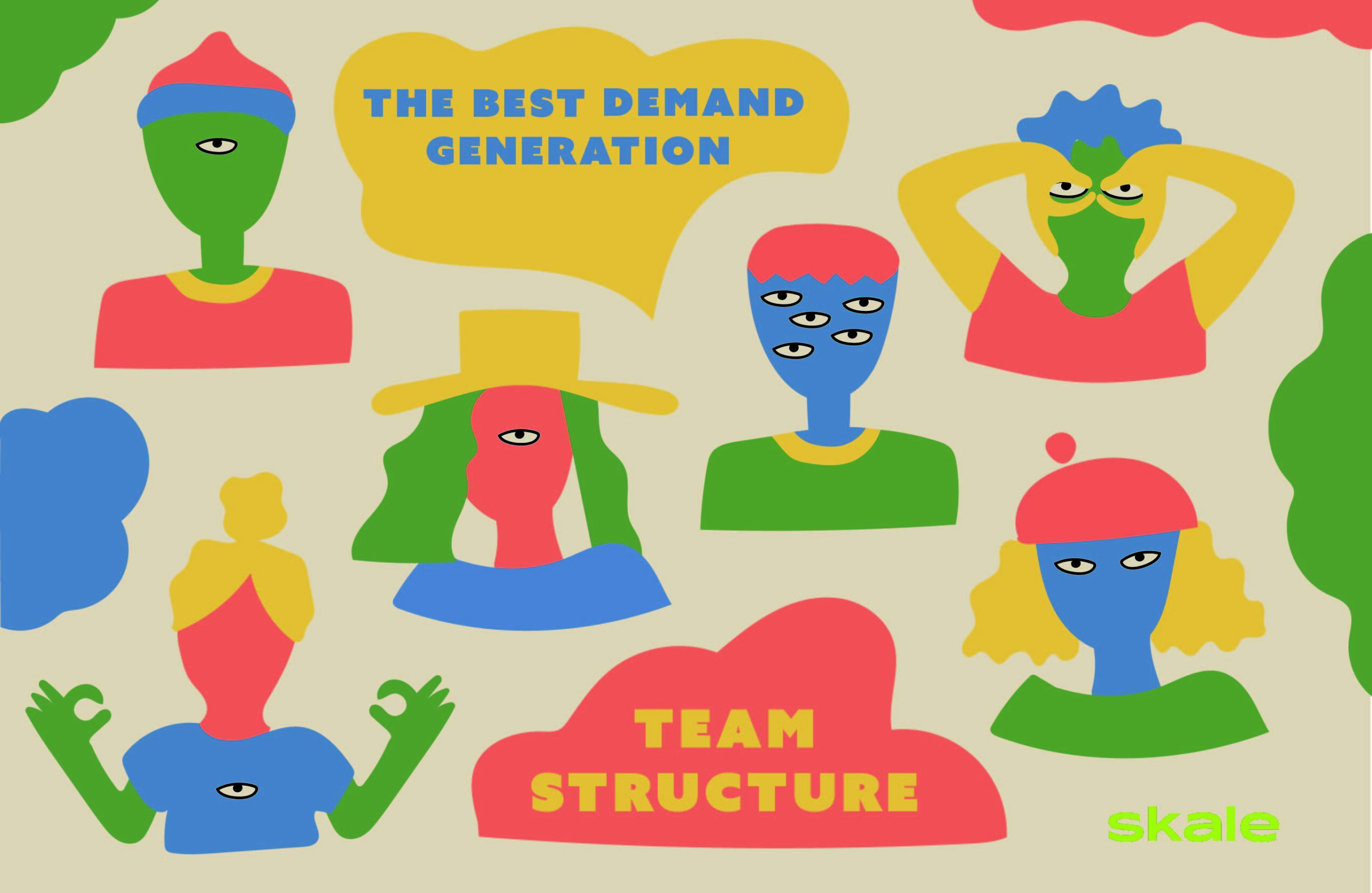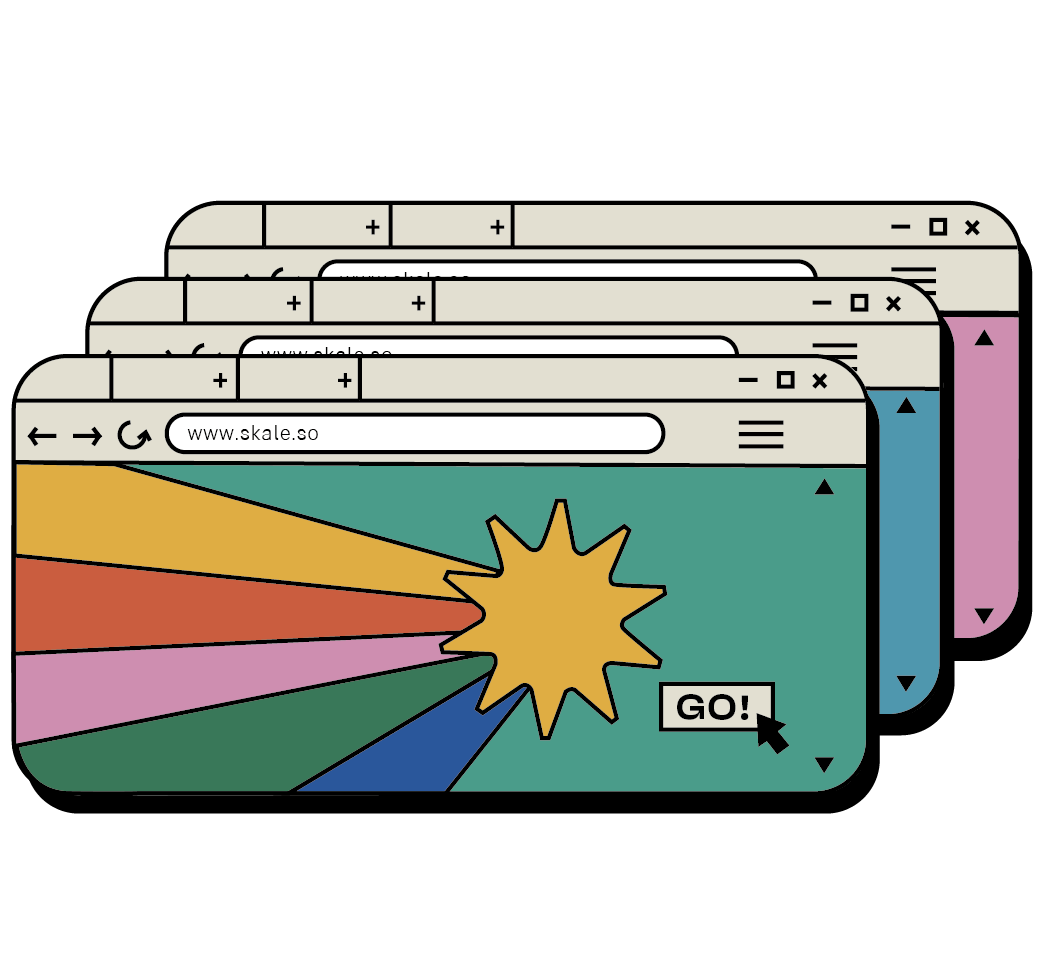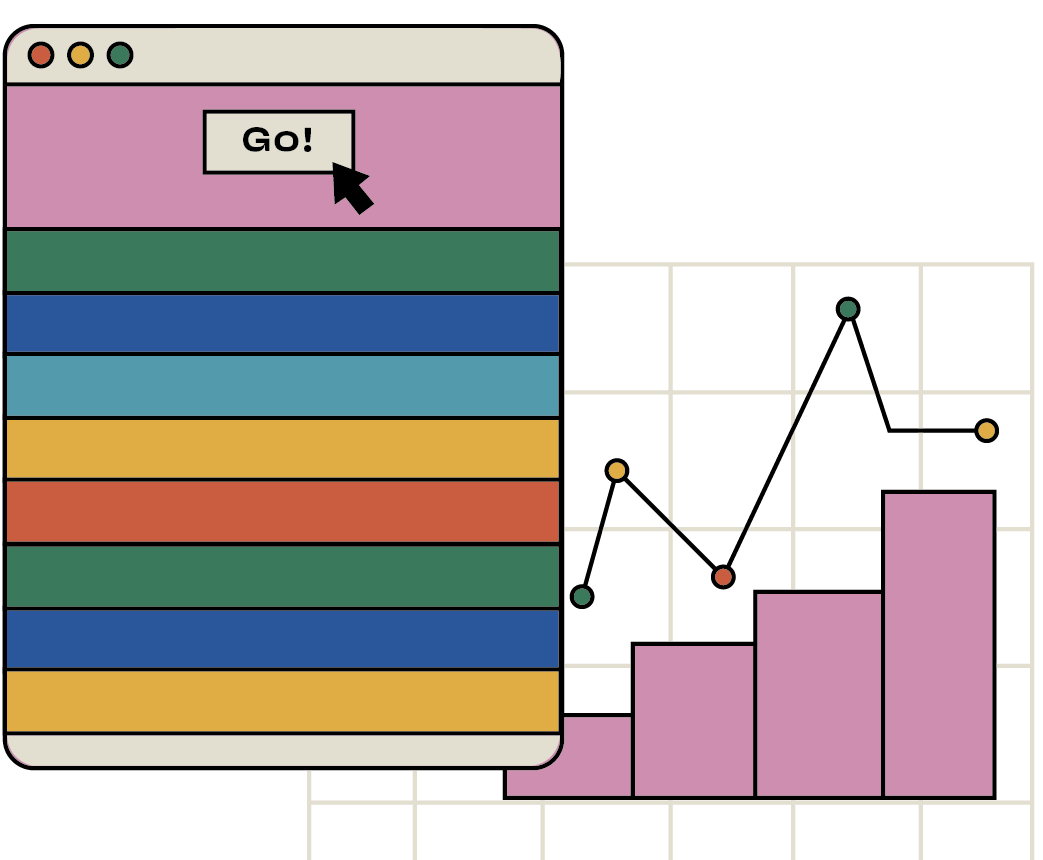
6 Elements to Include in your Demand Generation Process
Everything you need to know to build a stellar demand generation process, and a more profitable SaaS business.

Aloha! We know the importance of demand generation. It’s a buzzword that has rightfully earned its place in product marketing as a sure-fire way to earn your SaaS more qualified leads. How? By generating demand for your brand and product, before you start trying to sell it.
However, structuring a demand generation team that drives results is a whole other ball game. It’s one that many SaaS companies are still learning to navigate.
Not to worry, we’ve got you sorted, right here. In this article, we’ll explain the best demand gen team structures that are working for companies today—smoothly bridging the gap between marketing and sales teams.
We’ll look at the roles you’ll need and what you should be paying for those roles. We’ll also look at the goals your DG team should be accountable for, as well as explore your options for keeping the team in-house or outsourcing.
When you invest your budgets, time, and effort in hiring a stellar demand gen team you’re actively investing in your business’s growth, longevity, and bottom-line ROI.
Let’s start generating demand! 🏎️🌬️

Okay, let’s start things off by getting buy-in to build this team, whether that’s from yourself, or the person in your team that’s got the keys to the kitty.
An effective demand generation team has the power to:
🚀 Collect and utilize insights: whether your demand gen team does this via a competitor analysis, focus groups & interviews, observational research, or another method, it’s their priority to collect accurate data to fuel their demand generation initiatives.
🚀 Build a long-term growth strategy: from this data, your DG team should be putting together a long-term growth strategy that’s in a constant state of flux. This fluid document will guide your demand growth and ensure your team stays on track—as well as your stakeholders stay informed.
🚀 Create and publish content & messaging: an actionable demand generation team will then be responsible for putting together and distributing content that’s designed to pull your ICPs through the door—or through a link in most cases.
🚀 Run and maintain marketing initiatives & campaigns: they’ll then be in charge of ensuring your content and messaging are targeted towards fulfilling specific business initiatives and goals by creating demand generation campaigns that give your SaaS the demand boost it needs.
🚀 Digest and share learnings from analytics: last, but certainly not least, your demand generation team is responsible for gathering your campaign (among other) results and transforming this data to inform future demand generation initiatives as well as inform other departments and aid further business operations. Sales teams, marketing teams, finances teams, and customer care/support will all benefit from your demand generation team’s data sets.
📚 Looking for more? Check out our demand generation best practices.

Are you leveraging the right demand gen strategies?
We guide you through demand generation strategies and tactics that nurture SQLs
Discover the strategiesSo, let’s talk about team structure. First up, your demand generation team should ideally sit within the marketing team. This means the first/highest position of your team—director of demand generation—should report directly to your VP of marketing or CMO.
However, you may not actively need to hire as high as a director of demand generation; especially if you’re restricted by budget, time, or company goals.
That being said, identify the roles you need now to get s*** done. If you’re a relatively new, scrappy team, perhaps you need implementers over strategists. If you’ve got investor goals to hit, perhaps you need those higher-level roles to flesh out a team that meets what investors are looking for.
What are your immediate company goals? Build from there. Now then, let’s take a look at these demand generation roles on the table for your consideration. ⤵️
In this list we’ve included the roles and responsibilities of each role, key skills and attributes you’ll need in a candidate, as well as the going rate for these roles in 2022.
If you’d like us to research another role and get it on this list then reach out and let us know!
A director of demand generation should ideally sit directly under the VP of marketing. This role is responsible for the development and implementation of your holistic demand generation strategy. They’re responsible for automizing flows and processes where possible, and keeping tabs on the effectiveness of marketing campaigns and overall demand generation efforts.
The director of demand generation is also expected to work closely with directors from your marketing and sales team, maintaining feedback loops to ensure everyone has a solid overview of the demand generation process, campaigns, messaging, and learnings to help generate better marketing qualified leads.
This role will develop databases to target key roles and verticals, drive predictable pipeline activity, determine the best tactical content marketing mix, manage marketing budget allocations across multiple campaigns, head up reporting dashboards, source and implement new technology for the team to utilize.
Soft skills: Time management, collaboration, communication, problem-solving, leadership, organization.
Hard skills: 7+ years of digital marketing experience, lead generation & nurturing, strategic, SEO, PPC, lead scoring, marketing, a deep understanding of popular CRMs.
Average salary: $130,000
A Demand Generation Specialist is the Director’s right hand. This role aid with the implementation and day-to-day management of the marketing strategy and marketing efforts. The specialist should be able to identify a successful demand generation campaign and repeat its success as suggestions for future campaigns.
At times demand generation specialists will be expected to showcase thought leadership. However, their day-to-day will be ensuring all marketing automation flows are ticking over, as well as any active demand gen campaigns. They should have great knowledge of email marketing, understanding of the sales cycle, and the brand’s target audience.
Soft skills: Adaptability, planning, prioritizing, optimism, demand gen idea exchange, questioning, dependability, critical observation
Hard skills: 4+ Years of digital marketing experience, email marketing, CRM, marketing operations, project management, sales pipelines, lead generation, demand generation tools.
Average salary: $57,000
A project strategist or project manager is the glue that holds your team and your projects together. They’ll look to understand the risks and multiple potential outcomes of any project and be able to plan for them.
Your project manager is responsible for motivating the marketing team, ensuring that any demand generation campaign runs smoothly, and everyone does their part when needed. They’ll report directly to the demand generation manager.
Soft skills: Communication, time management, collaboration, communication, optimism, diplomacy, coordination, organization, planning.
Hard skills: project management, marketing campaigns, content marketing, lead generation, marketing automation, marketing operations.
Average salary: $65,000
This role is responsible for creating and implementing your SEO and content strategy to generate demand for your product. They’ll head up your on-page blog, as well as any off-page SEO activities and initiatives deemed necessary.
This role will lead the content function of the demand generation team, ensuring an understanding of the larger marketing strategy, as well as any content support the sales team may need. Their main goals are lead generation, and winning click-throughs from potential customers.
Soft skills: organization, goal setting, written communication, brainstorming, decision making, innovation, management skills.
Hard skills: search engine optimization, marketing strategies, sales funnel, marketing technology, CMS, inbound marketing, outbound marketing, writing & editing, social media.
Average salary: $61,000
Your social media manager or social media lead—depending on team size—is responsible for all of your social media channels, and sometimes your PR initiatives as well. They ensure your social channels are ticking over, implement strategies, share content, and work on brand partnerships.
They’re key for building brand awareness, and ensuring your demand generation strategy is followed across multiple channels. They’ll have their ear on the ground for your target market and can provide the entire demand generation department with valuable insights for great lead generation strategies.
Soft skills: Communication, interpersonal skills, attention to detail, planning, active listening, coordination, imagination, experimentation, empathy, humor, commitment.
Hard skills: social media management platforms, marketing activities, social sales tools, analytics, lead nurturing, customer loyalty, writing & editing.
Average salary: $55,000
Marketing engineers are technology engineers that are specifically working for and with the demand gen marketing team—in this case. They’re responsible in aiding the implementation of demand generation content, and ensuring that should any landing pages, app changes, or other technology be needed to generate leads that the technology aspect of this runs and smoothly as possible.
Soft skills: stress management, verbal communication, constructive feedback, self-management, logical reasoning, innovation, critical observation.
Hard skills: coding, programming, web development, coding technologies and languages, product management, hardware, technical support, product development.
Average salary: $88,000
A tech SEO analyst is hyper-important for your demand gen plan. If you’re not on Google, you’re simply not. So, your SEO analyst will give the marketing team the guidance and support they need to ensure your website—and specifically your blog—the best opportunity at ranking in that top spot on Google.
Product marketing needs a technical SEO analyst to look out for on and off-page content opportunities that will put your SaaS head, should, and link, above the competition.
Soft skills: Organization, planning, goal setting, presentation, written communication, calmness, observation, brainstorming, idea exchange.
Hard skills: Technical SEO, CMS, reporting, Excel/Google Sheets, Auditing.
Average salary:$50,000
Copywriting and content writing are such undervalued skills but are absolutely crucial in the effectiveness of your demand generation activities. Words are the make or break for successful customer engagement and loyalty.
Your copy or content writer will be responsible for communicating all demand gen campaigns across multiple channels; be it email marketing campaigns, social media, web and landing pages, in-product messaging, SMS, or something else—there’s always a whizz copywriter worrying away!
Soft skills: stress management, prioritizing, written communication, constructive feedback, self-management, self-motivation, imagination, authenticity, humor, cultural intelligence, and empathy.
Hard skills: grammar & punctuation, spelling, language skills, self-editing, research.
Average salary: $55,000

Turn leads to conversions with the right demand generation channels- here’s a list of the best
Read the listThis role specializes in identifying link-building opportunities on other pages with high domain authority and that are within your niche. They’ll work closely with your SEO lead and content writer to ensure your demand gen strategies remain top of mind and are informed with quality content and an accurate keyword strategy.
This role is also responsible for managing guest posts, partnerships and PR opportunities.
Soft skills: Communication (written and verbal), teamwork, self-motivation, attention to detail, creativity, networking.
Hard skills: SEO, PR, CMS, research, Google tools, email automation, and reporting.
Average salary: $45,000
Last, but certainly not least, no demand gen team is complete without a trusted designer. A designer is a key team member and will either report to the marketing manager, or to the content lead. The designer understands what every marketing campaign is trying to communicate and helps demand gen teams communicate that visually.
Your designer has a clear overview of the buyer’s journey, market segments, and your audience personas. They design empathetically, optimizing the user’s experience at every brand touch point and leaving them with a positive memory to walk away with.
Soft skills: stress management, organization, verbal communication, interpretation, creativity, imagination, humor, prioritizing.
Hard skills: design thinking, UI/UX, graphic design, design software, information architecture.
Average salary: $47,000
What type of goals should your demand generation team be shooting for? There are a few demand gen metrics and goals to pick from. To make your life easier, here’s a breakdown.
🏈 Increase in MQLs: your team should start seeing a pick up in marketing qualified leads; those that are open to receiving marketing materials from your SaaS.
🏈 Increase in SQLs: sales qualified leads are those people that are suitable to be sold to, these are lower in the funnel than MQLs.
🏈 Increase in CLTV: you’ll find that customers are more informed about your product and its potential, if your team is doing their job right. In this case, you’ll see an increase in customer lifetime value.
🏈 Increase in Sales Velocity: of course, an increase in demand means an increase in sales. You should see a general up in product sales across all markets.
🏈 Decrease in Churn: more qualified leads means more educated leads and this will leave to a decrease in customer churn as people know exactly what they’re signing up for.
🏈 Decrease in CPA: the demand generation team will invest in evergreen, long-term and low-cost content strategies which will lead to a decrease in cost per acquisition in the long run.
🏈 Increase in Content Performance: you’ll find your team is creating more appropriate and targeted content that resonates with your ICP. It’s going to perform better across multiple demand gen channels.
🏈 Increase in Close Rate: with an increase in MQLs and SQLs, you’ll also have an increase in close rate. This means a higher percentage of leads will close as a sale.
🏈 Increase in ROI: all of this leads to an increase in return of investment. Remember it can take up to six months to see a return on investment from a new hire, however, it’s well worth the wait.

We list the 9 best tools to generate SQLs, their key features, and why you need them
Read the listGreat question! And, it mostly comes down to your budget, physical office capabilities if you’re not a remote company, and your dependency on building an in-house team—which is often the case if you’ve got investors snapping at your heels.
You have a few options here:
Pros of hiring your entire team in-house are that you’re able to ignite them on your brand mission, and you have undiluted access to them—during company hours of course. However, if you’re looking to hire in-house you’re going to have to get extremely competitive with the offer you put on the table. There are a lot of great brands out there battling for the same talent.
Agencies often come at a fraction of the cost compared to in-house hires, and you’ll get a collective team behind doors at the agency. What’s more, agencies tend to be very results driven as they’re keen to keep your contract, as with freelancers, so you may find yourself getting better results from their demand gen efforts.
Hybrid tends to be a good blend of both worlds. When you have a hybrid team you hire management-level positions in-house and they can work and manage your agencies or freelance workforce. It’s a good option if you’re on a budget, but also if you’re looking for expertise and diversity in your demand generation team.
A demand generation team is a branch of the marketing team that focuses on creating and maintaining demand for your brand and product—at every step in the customer lifecycle.
Your product marketing team is responsible for demand generation. They work closely with sales and marketing to put together campaigns, strategies, and messaging that ensure your SaaS continues to win demand.
A demand generation role is a function within a demand generation team. Some of these roles include: demand generation directors, technical SEO analysts, content writers, social media managers, tech engineers, and more.
Learn more about
Demand Gen

6 Elements to Include in your Demand Generation Process
Everything you need to know to build a stellar demand generation process, and a more profitable SaaS business.

How to Craft a Winning Demand Generation Plan
Your eight-step guide to crafting a demand generation plan that helps your SaaS take flight.

The Best Channels for your Demand Generation Strategy
Discover the top 7 demand generation channels and how they can help rocket success for your SaaS.